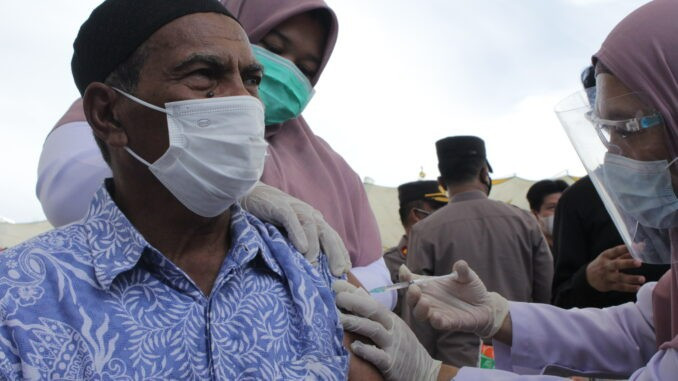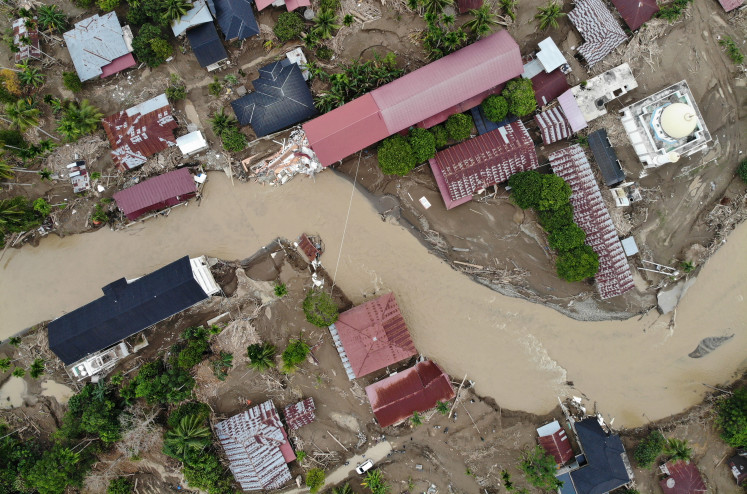Popular Reads
Top Results
Can't find what you're looking for?
View all search resultsPopular Reads
Top Results
Can't find what you're looking for?
View all search resultsMore than a shot in the arm needed to heal the global economy
Those countries with more vulnerable economies and populations will face challenges as the exit from the pandemic progresses.
Change text size
Gift Premium Articles
to Anyone
 Priority jabs: An elder received a COVID-19 vaccine jab that was administered by a nurse during a vaccination drive held in Banda Aceh recently. The Banda Aceh Health Agency, joining forces with the Ministry of Communication and Information, UNICEF and KPCPEN has organized series of vaccination drives that focusing on the town elders. (Courtesy of the Banda Aceh Health Agency)
Priority jabs: An elder received a COVID-19 vaccine jab that was administered by a nurse during a vaccination drive held in Banda Aceh recently. The Banda Aceh Health Agency, joining forces with the Ministry of Communication and Information, UNICEF and KPCPEN has organized series of vaccination drives that focusing on the town elders. (Courtesy of the Banda Aceh Health Agency)
T
he world entered the COVID-19 crisis suddenly and as one. Exiting the pandemic is proving slower and more staggered. The economic recovery is uneven, and vaccination is crucial to “pandexit”.
More vaccination means fewer infections, more easing of restrictions and more economic growth, as the Bank for International Settlements (BIS) outlines in its Annual Economic Report 2021. But vaccination alone may not suffice. Better COVID-19 treatment options could complement vaccination, and in turn open up economies faster, support jobs and boost global growth.
The global recovery is proceeding at multiple speeds, and this is likely to continue. The United States and China are in the lead, followed by a number of advanced economies. The rebound in these countries has been stronger than expected.
This is in part because pandemic risks have receded in some countries, reflecting the quick roll-out of vaccinations or effective steps to prevent infections, such as better testing and tracing of infection chains -- or both. Rapid economic growth in the largest economies typically has knock-on benefits for the rest of the world.
But many emerging market economies (EMEs) are lagging in coping with the virus. Those countries with more vulnerable economies and populations will face challenges as the exit from the pandemic progresses. If growth and vaccination rates in the leading economies are greater than expected, EMEs could face a double whammy of more infections and tighter financing conditions, forcing them to pay higher interest rates on debt.
It may seem unusual for economists to prescribe a remedy for a health crisis. But in the case of the COVID-19 pandemic, the fate of the global economy is directly linked to health policy. That's why the BIS conducted an analysis of alternative “pandexit” strategies in its flagship annual report.
For a more broad-based economic recovery, all countries need to quickly and safely reopen. Vaccination is vital. Efforts to speed up production and distribute vaccines more equitably across nations, such as the recent pledge from the Group of 7, must continue and accelerate.
Vaccines pay for themselves, as colleagues at other multilateral organizations have also stressed. The International Monetary Fund estimates that a US$50 billion investment in vaccinations would generate some $9 trillion in additional global economic output by 2025.
However, relying on vaccination alone is not enough.
Supplies of vaccines are still limited and herd immunity will be out of reach for most countries for some time. At the current pace, half of the world population would not receive a single shot by the end of the year. The virus will continue to mutate and could become resistant to current vaccines. New ones will take time to develop and produce.
Better treatment can be a backstop to vaccinations. Halving the fatality rates of COVID-19 patients could help economies re-open safely even if vaccination progresses a third more slowly than today, BIS analysis finds, and would make up for most of the output lost.
Better treatment is also needed if COVID-19 is not eradicated and ends up being with us for good, like the flu, as many consider most likely. If so, allocating resources to these efforts today would yield even larger benefits.
Research on novel treatment methods is ongoing, with clinical trials of new therapies in many countries and significant investment, for example in the United States. Some new treatments could prove to be a game changer. Now is the time to prepare to quickly implement new treatments once available. The costs likely pale in comparison to the alternatives of intermittent lockdowns and fatalities.
International cooperation is essential. If we vaccinate and treat successfully worldwide, the gains on a global scale could be much larger than if countries rely on their own resources alone The boost to trade and reduction in cross-border infections would benefit all.
In the longer-term, to secure a durable recovery, the extraordinary support from governments and central banks will need to be withdrawn. Unlike the vaccination drive, this is a marathon, not a sprint. Policymakers will also need to make strategic decisions to re-allocate support and address the long-term consequences of the pandemic, notably its impact on patterns of economic activity. Structural reforms that promote a vibrant, flexible and competitive economy are essential.
***
The writer is general manager of Bank for International Settlements (BIS).









